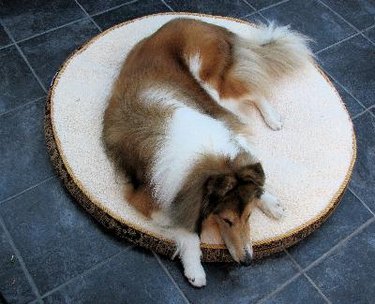
Though many dog owners don't think about it, dogs need their teeth cared for just like people do. Over time and due to normal eating activities, plaque can build on tooth surfaces and up along the gum line, leading to bad breath, tooth decay and loosening teeth. You veterinarian can provide tooth cleaning and other dental procedures with general anesthesia. Recovery from anesthesia takes place both at the vet's office and at home. Either way, the owner must provide supervision and monitoring for post-procedure problems.
About Dental Anesthesia
Video of the Day
Veterinarians receive intensive training on the administration of anesthesia. The amount of anesthetic to administer is determined by many factors, including the size, weight, age and general health of the animal. A preanesthetic injection helps to keep the dog and limit the amount of anesthesia that is required. Dogs with existing health problems may need blood work before the procedure to monitor kidney and liver function issues that could cause problems. Most veterinarians provide an aftercare sheet for animals that have been put under anesthesia for dental or other procedures.
Video of the Day
Recovery From Anesthesia
The veterinarian may administer pure oxygen to help to revive your dog from the anesthesia. Oxygen helps to clear the dog's system of the chemicals so that he can function normally. However, the animal's balance and reflexes may still be affected by the anesthesia, so ensure that he is in no danger from falling or other hazards that require quick movements to avoid injury. Keep the dog in a quiet area of your home, away from other pets until he is fully recovered and acting like himself. Mild coughing can occur after anesthesia and is generally not a cause for concern.
Limit Food and Water
Anesthesia can cause nausea, so provide a small amount of soft, nutritious food for your dog during the recovery period. If teeth have been extracted, the dog may suffer nausea from any small amount of blood that the dog swallowed. A small amount of blood in the mouth is not a concern unless it progresses to more profuse bleeding. The animal might not have a bowel movement for 24 to 48 hours after anesthesia.
Keep Your Dog Warm
According to veterinary doctor Robert D. Keegan, writing on the Washington State University website, anesthesia can alter the temperature "set point" in the animal's brain, causing blood vessels to dilate. This reaction can cause heat loss in the dog's body, so ensure that the animal is kept in a warm but not hot room after the procedure. Breeds that can tolerate cold weather and retain heat easily, such as malamutes and huskies, benefit more from a cooler room.
Monitor the Animal Closely
Effects of anesthesia can last up to several days after the dental procedure is done. The dog's behavior can be unpredictable in this period. Monitor the animal closely for signs of pain or infection. Keep small children away from the animal until he is completely recovered. Follow the veterinarian's aftercare instructions carefully. If any unusual behaviors or symptoms appear, call the veterinarian for further advice.
Always check with your veterinarian before changing your pet’s diet, medication, or physical activity routines. This information is not a substitute for a vet’s opinion.